The Routledge International Handbook of Innovative Qualitative Psychological Research (eBook, ePUB)
Redaktion: Tseliou, Eleftheria; Gough, Brendan; Georgaca, Eugenie; Demuth, Carolin
46,95 €
46,95 €
inkl. MwSt.
Sofort per Download lieferbar

23 °P sammeln
46,95 €
Als Download kaufen

46,95 €
inkl. MwSt.
Sofort per Download lieferbar

23 °P sammeln
Jetzt verschenken
Alle Infos zum eBook verschenken
46,95 €
inkl. MwSt.
Sofort per Download lieferbar
Alle Infos zum eBook verschenken

23 °P sammeln
The Routledge International Handbook of Innovative Qualitative Psychological Research (eBook, ePUB)
Redaktion: Tseliou, Eleftheria; Gough, Brendan; Georgaca, Eugenie; Demuth, Carolin
- Format: ePub
- Merkliste
- Auf die Merkliste
- Bewerten Bewerten
- Teilen
- Produkt teilen
- Produkterinnerung
- Produkterinnerung

Bitte loggen Sie sich zunächst in Ihr Kundenkonto ein oder registrieren Sie sich bei
bücher.de, um das eBook-Abo tolino select nutzen zu können.
Hier können Sie sich einloggen
Hier können Sie sich einloggen
Sie sind bereits eingeloggt. Klicken Sie auf 2. tolino select Abo, um fortzufahren.

Bitte loggen Sie sich zunächst in Ihr Kundenkonto ein oder registrieren Sie sich bei bücher.de, um das eBook-Abo tolino select nutzen zu können.
The contemporary world currently faces multi-level challenges, including cross border migration, economic crises and myriad health issues, including the recent Covid-19 pandemic.
- Geräte: eReader
- mit Kopierschutz
- eBook Hilfe
Andere Kunden interessierten sich auch für
![The Routledge International Handbook of Innovative Qualitative Psychological Research (eBook, PDF) The Routledge International Handbook of Innovative Qualitative Psychological Research (eBook, PDF)]() The Routledge International Handbook of Innovative Qualitative Psychological Research (eBook, PDF)46,95 €
The Routledge International Handbook of Innovative Qualitative Psychological Research (eBook, PDF)46,95 €![The Essence of Multivariate Thinking (eBook, ePUB) The Essence of Multivariate Thinking (eBook, ePUB)]() Lisa L. HarlowThe Essence of Multivariate Thinking (eBook, ePUB)54,95 €
Lisa L. HarlowThe Essence of Multivariate Thinking (eBook, ePUB)54,95 €![Undertaking Capstone and Final Year Projects in Psychology (eBook, ePUB) Undertaking Capstone and Final Year Projects in Psychology (eBook, ePUB)]() Jolanta BurkeUndertaking Capstone and Final Year Projects in Psychology (eBook, ePUB)34,95 €
Jolanta BurkeUndertaking Capstone and Final Year Projects in Psychology (eBook, ePUB)34,95 €![Research Methods and Statistics in Psychology (eBook, ePUB) Research Methods and Statistics in Psychology (eBook, ePUB)]() Hugh CoolicanResearch Methods and Statistics in Psychology (eBook, ePUB)52,95 €
Hugh CoolicanResearch Methods and Statistics in Psychology (eBook, ePUB)52,95 €![SPSS Explained (eBook, ePUB) SPSS Explained (eBook, ePUB)]() Perry R. HintonSPSS Explained (eBook, ePUB)52,95 €
Perry R. HintonSPSS Explained (eBook, ePUB)52,95 €![Crafting Your Thesis (eBook, ePUB) Crafting Your Thesis (eBook, ePUB)]() Johan AlvehusCrafting Your Thesis (eBook, ePUB)40,95 €
Johan AlvehusCrafting Your Thesis (eBook, ePUB)40,95 €![R Data Analysis without Programming (eBook, ePUB) R Data Analysis without Programming (eBook, ePUB)]() David W. GerbingR Data Analysis without Programming (eBook, ePUB)52,95 €
David W. GerbingR Data Analysis without Programming (eBook, ePUB)52,95 €-
-
-
The contemporary world currently faces multi-level challenges, including cross border migration, economic crises and myriad health issues, including the recent Covid-19 pandemic.
Dieser Download kann aus rechtlichen Gründen nur mit Rechnungsadresse in A, B, BG, CY, CZ, D, DK, EW, E, FIN, F, GR, HR, H, IRL, I, LT, L, LR, M, NL, PL, P, R, S, SLO, SK ausgeliefert werden.
Produktdetails
- Produktdetails
- Verlag: Taylor & Francis eBooks
- Seitenzahl: 452
- Erscheinungstermin: 10. November 2023
- Englisch
- ISBN-13: 9781000982138
- Artikelnr.: 68996315
- Verlag: Taylor & Francis eBooks
- Seitenzahl: 452
- Erscheinungstermin: 10. November 2023
- Englisch
- ISBN-13: 9781000982138
- Artikelnr.: 68996315
- Herstellerkennzeichnung Die Herstellerinformationen sind derzeit nicht verfügbar.
Eleftheria Tseliou is Professor of Research Methodology and Qualitative Methods at the University of Thessaly, Greece. Carolin Demuth is Associate Professor in Cultural and Developmental Psychology at Aalborg University, Denmark, where she teaches Qualitative Methods, Developmental Psychology and Cultural Psychology. Eugenie Georgaca is Associate Professor in Clinical Psychology at the School of Psychology of the Aristotle University of Thessaloniki, Greece. Brendan Gough is a social psychologist and qualitative researcher based at Leeds Beckett University, UK, and mainly works in the field of masculinity and men's health. He is cofounder and coeditor of the journal Qualitative Research in Psychology.
FOREWORD
Kenneth Gergen
PART I. SETTING THE SCENE: QUALITATIVE PSCYHOLOGICAL RESEARCH AND
INNOVATION
1. Innovation in qualitative psychological research: Tackling
methodological and societal challenges Eleftheria Tseliou, Brendan
Gough, Carolin Demuth and Eugenie Georgaca
2. Diversity with a purpose: Reflections on qualitative psychology
research Carla Willig
3. The line as a root metaphor for qualitative psychology Svend
Brinkmann
part II. Innovation in the process of inquiry: Method-focused
contributions
EDITOR: Eleftheria Tseliou
4. Performative social science Günter Mey
5. Dramatization: Cultural and psychological foundations of performative
methodologies Shuangshuang Xu and Luca Tateo
6. Combining narrative inquiry and Foucaultian discourse analysis:
Narrative-discursive analysis Marco Gemignani and Viv Burr
7. Sociopsychodrama as a qualitative research method Vedrana Mirkovi¿
and Jana Damjanov
8. Analytical pluralism: An application to the exploration of adult
attachment Deborah Bailey-Rodriguez and Nollaig Frost
9. Children's drawings as data in psychology: Replicating William
Stern's 1905 study on the Land of Plenty Andrea Kleeberg-Niepage and
Johanna Degen
10. Disentangling meaning in hard to understand data through expanding
the Listening Guide Franziska Müller, Sasmita Rosari, Jessica Höhn,
Marie-Luise Springmann, and Mechthild Kiegelmann
11. Researchers' triangulation in interviews analyses: Inter-subjectivity
as an asset for the production of original interpretative ideas An
illustration with a French research on intimate partner violence
experience Leìa Restivo, Solveig Lelaurain and Theìmis Apostolidis
REFLECTION
From Epistemology and Integrating Multiple Methods to Performing
Social Science Reflections on Section 1 "Innovation in the Process of
Inquiry: Method-focused Contributions" Uwe Flick
PART III: Innovative participant-centered health and mental health
projects
EDITOR: Eugenie Georgaca
12. How can incorporating participant-generated photographs with
interviews enhance interpretative phenomenological accounts about
living with chronic illness? Iain R. Willamson, Periklis Papaloukas,
Nicholas Shaw, Emily Print and Kerry Quincey
13. Body mapping the experience of fibromyalgia syndrome Maja Smrdu &
Laura Jereb
14. Creative phenomenology within health and social care research:
Bridging the gap between experience and expression William Day,
Shioma-Lei Craythorne, Tiago Moutela, Katharine Slade, and Gemma
Heath
15. Alliance ruptures and repairs as a discursive process: A Conversation
Analysis perspective Peter Muntigl & Adam Horvath
16. Tracking change in group psychotherapy: Systematic methodological
steps to record the development of clients' inner voices Maria Viou,
& Eugenie Georgaca
17. Inner and outer dialogue in couple therapy: The potential of
Stimulated Recall Interviews Virpi-Liisa Kykyri, Jarl Wahlström, &
Jaakko Seikkula
REFLECTION
New ways of looking, new things to see: Invited Reflection on Part
III Jonathan A Smith
PART IV: Innovative COMMUNITY-FOCUSED PROJECTS
EDITOR: Brendan Gough
18. Working with, not on unemployed people: How to explore subjective
unemployment experiences in the affective economy Sabina Pultz
19. Using Innovative Qualitative Research Methods in Vulnerable
Populations: Image-Based Research as Culturally Sensitive Alessandro
Pepe and Loredana Addimando
20. Asset Mapping Towards Community Development: Exploring Home-Based
Care Services in Cairo, Egypt Yomna M. El-Taweel and Irene Strasser
21. From capturing social issues to art production and community
mobilization: A participatory multimodal study of life in Eleusis
Issari, P., Karydi, E., Georgaca, E., Koliouli, F., Skali, D.,
Papadopoulos, N., El Raheb, K., Ioannidis, Y., Kalabratsidou, V.,
Diamantides, P., Stergiou, M., Gkiokas, P. and Vassilakou, V.
22. Systems thinking, rhizomes, and community-based qualitative research:
An introduction to Nomadic Thematic Analysis Alexios Brailas and
Konstantinos Papachristopoulos
REFLECTION
Innovative community-focused projects: critical reflection Rebecca
Lawthom
PART V: Thinking innovatively about societal issues
EDITOR: Carolin Demuth
23. Beyond procedural ethics: four levels of research ethics in
qualitative research Laure Kloetzer
24. Collaborative practice research: Inequality in school as an example
Charlotte Højholt
25. Applying discursive methodologies to understanding hate speech on
social media platforms Simon Goodman, Abigail Locke, Mick Finlay and
Rosemary Lobban
26. Toilet talk: (Trans)Gendered negotiation of public spaces John
Somers, Shani Burke, Philippa Carr and Mirko Demasi
27. Accessing ambivalences of the (feminist) self?! Advancing
psychosocial analyses at the intersection of explicit and implicit
knowledge by using the documentary method Katharina Hametner, Natalie
Rodax and Sandra Reisch
28. Learning Pluralism and Researching Pluralistically: Pluralistic
Qualitative Research as a model for teaching and learning qualitative
research in psychology Sarah Foley, Nollaig Frost and Maria Dempsey
REFLECTION
Methods in Society: Constrained Pluralism Jan Valsiner
CLOSING
29. Innovative qualitative psychological research in light of pressing
methodological, societal and health challenges - looking ahead
Carolin Demuth, Eugenie Georgaca, Brendan Gough and Eleftheria
Tseliou
Kenneth Gergen
PART I. SETTING THE SCENE: QUALITATIVE PSCYHOLOGICAL RESEARCH AND
INNOVATION
1. Innovation in qualitative psychological research: Tackling
methodological and societal challenges Eleftheria Tseliou, Brendan
Gough, Carolin Demuth and Eugenie Georgaca
2. Diversity with a purpose: Reflections on qualitative psychology
research Carla Willig
3. The line as a root metaphor for qualitative psychology Svend
Brinkmann
part II. Innovation in the process of inquiry: Method-focused
contributions
EDITOR: Eleftheria Tseliou
4. Performative social science Günter Mey
5. Dramatization: Cultural and psychological foundations of performative
methodologies Shuangshuang Xu and Luca Tateo
6. Combining narrative inquiry and Foucaultian discourse analysis:
Narrative-discursive analysis Marco Gemignani and Viv Burr
7. Sociopsychodrama as a qualitative research method Vedrana Mirkovi¿
and Jana Damjanov
8. Analytical pluralism: An application to the exploration of adult
attachment Deborah Bailey-Rodriguez and Nollaig Frost
9. Children's drawings as data in psychology: Replicating William
Stern's 1905 study on the Land of Plenty Andrea Kleeberg-Niepage and
Johanna Degen
10. Disentangling meaning in hard to understand data through expanding
the Listening Guide Franziska Müller, Sasmita Rosari, Jessica Höhn,
Marie-Luise Springmann, and Mechthild Kiegelmann
11. Researchers' triangulation in interviews analyses: Inter-subjectivity
as an asset for the production of original interpretative ideas An
illustration with a French research on intimate partner violence
experience Leìa Restivo, Solveig Lelaurain and Theìmis Apostolidis
REFLECTION
From Epistemology and Integrating Multiple Methods to Performing
Social Science Reflections on Section 1 "Innovation in the Process of
Inquiry: Method-focused Contributions" Uwe Flick
PART III: Innovative participant-centered health and mental health
projects
EDITOR: Eugenie Georgaca
12. How can incorporating participant-generated photographs with
interviews enhance interpretative phenomenological accounts about
living with chronic illness? Iain R. Willamson, Periklis Papaloukas,
Nicholas Shaw, Emily Print and Kerry Quincey
13. Body mapping the experience of fibromyalgia syndrome Maja Smrdu &
Laura Jereb
14. Creative phenomenology within health and social care research:
Bridging the gap between experience and expression William Day,
Shioma-Lei Craythorne, Tiago Moutela, Katharine Slade, and Gemma
Heath
15. Alliance ruptures and repairs as a discursive process: A Conversation
Analysis perspective Peter Muntigl & Adam Horvath
16. Tracking change in group psychotherapy: Systematic methodological
steps to record the development of clients' inner voices Maria Viou,
& Eugenie Georgaca
17. Inner and outer dialogue in couple therapy: The potential of
Stimulated Recall Interviews Virpi-Liisa Kykyri, Jarl Wahlström, &
Jaakko Seikkula
REFLECTION
New ways of looking, new things to see: Invited Reflection on Part
III Jonathan A Smith
PART IV: Innovative COMMUNITY-FOCUSED PROJECTS
EDITOR: Brendan Gough
18. Working with, not on unemployed people: How to explore subjective
unemployment experiences in the affective economy Sabina Pultz
19. Using Innovative Qualitative Research Methods in Vulnerable
Populations: Image-Based Research as Culturally Sensitive Alessandro
Pepe and Loredana Addimando
20. Asset Mapping Towards Community Development: Exploring Home-Based
Care Services in Cairo, Egypt Yomna M. El-Taweel and Irene Strasser
21. From capturing social issues to art production and community
mobilization: A participatory multimodal study of life in Eleusis
Issari, P., Karydi, E., Georgaca, E., Koliouli, F., Skali, D.,
Papadopoulos, N., El Raheb, K., Ioannidis, Y., Kalabratsidou, V.,
Diamantides, P., Stergiou, M., Gkiokas, P. and Vassilakou, V.
22. Systems thinking, rhizomes, and community-based qualitative research:
An introduction to Nomadic Thematic Analysis Alexios Brailas and
Konstantinos Papachristopoulos
REFLECTION
Innovative community-focused projects: critical reflection Rebecca
Lawthom
PART V: Thinking innovatively about societal issues
EDITOR: Carolin Demuth
23. Beyond procedural ethics: four levels of research ethics in
qualitative research Laure Kloetzer
24. Collaborative practice research: Inequality in school as an example
Charlotte Højholt
25. Applying discursive methodologies to understanding hate speech on
social media platforms Simon Goodman, Abigail Locke, Mick Finlay and
Rosemary Lobban
26. Toilet talk: (Trans)Gendered negotiation of public spaces John
Somers, Shani Burke, Philippa Carr and Mirko Demasi
27. Accessing ambivalences of the (feminist) self?! Advancing
psychosocial analyses at the intersection of explicit and implicit
knowledge by using the documentary method Katharina Hametner, Natalie
Rodax and Sandra Reisch
28. Learning Pluralism and Researching Pluralistically: Pluralistic
Qualitative Research as a model for teaching and learning qualitative
research in psychology Sarah Foley, Nollaig Frost and Maria Dempsey
REFLECTION
Methods in Society: Constrained Pluralism Jan Valsiner
CLOSING
29. Innovative qualitative psychological research in light of pressing
methodological, societal and health challenges - looking ahead
Carolin Demuth, Eugenie Georgaca, Brendan Gough and Eleftheria
Tseliou
FOREWORD
Kenneth Gergen
PART I. SETTING THE SCENE: QUALITATIVE PSCYHOLOGICAL RESEARCH AND
INNOVATION
1. Innovation in qualitative psychological research: Tackling
methodological and societal challenges Eleftheria Tseliou, Brendan
Gough, Carolin Demuth and Eugenie Georgaca
2. Diversity with a purpose: Reflections on qualitative psychology
research Carla Willig
3. The line as a root metaphor for qualitative psychology Svend
Brinkmann
part II. Innovation in the process of inquiry: Method-focused
contributions
EDITOR: Eleftheria Tseliou
4. Performative social science Günter Mey
5. Dramatization: Cultural and psychological foundations of performative
methodologies Shuangshuang Xu and Luca Tateo
6. Combining narrative inquiry and Foucaultian discourse analysis:
Narrative-discursive analysis Marco Gemignani and Viv Burr
7. Sociopsychodrama as a qualitative research method Vedrana Mirkovi¿
and Jana Damjanov
8. Analytical pluralism: An application to the exploration of adult
attachment Deborah Bailey-Rodriguez and Nollaig Frost
9. Children's drawings as data in psychology: Replicating William
Stern's 1905 study on the Land of Plenty Andrea Kleeberg-Niepage and
Johanna Degen
10. Disentangling meaning in hard to understand data through expanding
the Listening Guide Franziska Müller, Sasmita Rosari, Jessica Höhn,
Marie-Luise Springmann, and Mechthild Kiegelmann
11. Researchers' triangulation in interviews analyses: Inter-subjectivity
as an asset for the production of original interpretative ideas An
illustration with a French research on intimate partner violence
experience Leìa Restivo, Solveig Lelaurain and Theìmis Apostolidis
REFLECTION
From Epistemology and Integrating Multiple Methods to Performing
Social Science Reflections on Section 1 "Innovation in the Process of
Inquiry: Method-focused Contributions" Uwe Flick
PART III: Innovative participant-centered health and mental health
projects
EDITOR: Eugenie Georgaca
12. How can incorporating participant-generated photographs with
interviews enhance interpretative phenomenological accounts about
living with chronic illness? Iain R. Willamson, Periklis Papaloukas,
Nicholas Shaw, Emily Print and Kerry Quincey
13. Body mapping the experience of fibromyalgia syndrome Maja Smrdu &
Laura Jereb
14. Creative phenomenology within health and social care research:
Bridging the gap between experience and expression William Day,
Shioma-Lei Craythorne, Tiago Moutela, Katharine Slade, and Gemma
Heath
15. Alliance ruptures and repairs as a discursive process: A Conversation
Analysis perspective Peter Muntigl & Adam Horvath
16. Tracking change in group psychotherapy: Systematic methodological
steps to record the development of clients' inner voices Maria Viou,
& Eugenie Georgaca
17. Inner and outer dialogue in couple therapy: The potential of
Stimulated Recall Interviews Virpi-Liisa Kykyri, Jarl Wahlström, &
Jaakko Seikkula
REFLECTION
New ways of looking, new things to see: Invited Reflection on Part
III Jonathan A Smith
PART IV: Innovative COMMUNITY-FOCUSED PROJECTS
EDITOR: Brendan Gough
18. Working with, not on unemployed people: How to explore subjective
unemployment experiences in the affective economy Sabina Pultz
19. Using Innovative Qualitative Research Methods in Vulnerable
Populations: Image-Based Research as Culturally Sensitive Alessandro
Pepe and Loredana Addimando
20. Asset Mapping Towards Community Development: Exploring Home-Based
Care Services in Cairo, Egypt Yomna M. El-Taweel and Irene Strasser
21. From capturing social issues to art production and community
mobilization: A participatory multimodal study of life in Eleusis
Issari, P., Karydi, E., Georgaca, E., Koliouli, F., Skali, D.,
Papadopoulos, N., El Raheb, K., Ioannidis, Y., Kalabratsidou, V.,
Diamantides, P., Stergiou, M., Gkiokas, P. and Vassilakou, V.
22. Systems thinking, rhizomes, and community-based qualitative research:
An introduction to Nomadic Thematic Analysis Alexios Brailas and
Konstantinos Papachristopoulos
REFLECTION
Innovative community-focused projects: critical reflection Rebecca
Lawthom
PART V: Thinking innovatively about societal issues
EDITOR: Carolin Demuth
23. Beyond procedural ethics: four levels of research ethics in
qualitative research Laure Kloetzer
24. Collaborative practice research: Inequality in school as an example
Charlotte Højholt
25. Applying discursive methodologies to understanding hate speech on
social media platforms Simon Goodman, Abigail Locke, Mick Finlay and
Rosemary Lobban
26. Toilet talk: (Trans)Gendered negotiation of public spaces John
Somers, Shani Burke, Philippa Carr and Mirko Demasi
27. Accessing ambivalences of the (feminist) self?! Advancing
psychosocial analyses at the intersection of explicit and implicit
knowledge by using the documentary method Katharina Hametner, Natalie
Rodax and Sandra Reisch
28. Learning Pluralism and Researching Pluralistically: Pluralistic
Qualitative Research as a model for teaching and learning qualitative
research in psychology Sarah Foley, Nollaig Frost and Maria Dempsey
REFLECTION
Methods in Society: Constrained Pluralism Jan Valsiner
CLOSING
29. Innovative qualitative psychological research in light of pressing
methodological, societal and health challenges - looking ahead
Carolin Demuth, Eugenie Georgaca, Brendan Gough and Eleftheria
Tseliou
Kenneth Gergen
PART I. SETTING THE SCENE: QUALITATIVE PSCYHOLOGICAL RESEARCH AND
INNOVATION
1. Innovation in qualitative psychological research: Tackling
methodological and societal challenges Eleftheria Tseliou, Brendan
Gough, Carolin Demuth and Eugenie Georgaca
2. Diversity with a purpose: Reflections on qualitative psychology
research Carla Willig
3. The line as a root metaphor for qualitative psychology Svend
Brinkmann
part II. Innovation in the process of inquiry: Method-focused
contributions
EDITOR: Eleftheria Tseliou
4. Performative social science Günter Mey
5. Dramatization: Cultural and psychological foundations of performative
methodologies Shuangshuang Xu and Luca Tateo
6. Combining narrative inquiry and Foucaultian discourse analysis:
Narrative-discursive analysis Marco Gemignani and Viv Burr
7. Sociopsychodrama as a qualitative research method Vedrana Mirkovi¿
and Jana Damjanov
8. Analytical pluralism: An application to the exploration of adult
attachment Deborah Bailey-Rodriguez and Nollaig Frost
9. Children's drawings as data in psychology: Replicating William
Stern's 1905 study on the Land of Plenty Andrea Kleeberg-Niepage and
Johanna Degen
10. Disentangling meaning in hard to understand data through expanding
the Listening Guide Franziska Müller, Sasmita Rosari, Jessica Höhn,
Marie-Luise Springmann, and Mechthild Kiegelmann
11. Researchers' triangulation in interviews analyses: Inter-subjectivity
as an asset for the production of original interpretative ideas An
illustration with a French research on intimate partner violence
experience Leìa Restivo, Solveig Lelaurain and Theìmis Apostolidis
REFLECTION
From Epistemology and Integrating Multiple Methods to Performing
Social Science Reflections on Section 1 "Innovation in the Process of
Inquiry: Method-focused Contributions" Uwe Flick
PART III: Innovative participant-centered health and mental health
projects
EDITOR: Eugenie Georgaca
12. How can incorporating participant-generated photographs with
interviews enhance interpretative phenomenological accounts about
living with chronic illness? Iain R. Willamson, Periklis Papaloukas,
Nicholas Shaw, Emily Print and Kerry Quincey
13. Body mapping the experience of fibromyalgia syndrome Maja Smrdu &
Laura Jereb
14. Creative phenomenology within health and social care research:
Bridging the gap between experience and expression William Day,
Shioma-Lei Craythorne, Tiago Moutela, Katharine Slade, and Gemma
Heath
15. Alliance ruptures and repairs as a discursive process: A Conversation
Analysis perspective Peter Muntigl & Adam Horvath
16. Tracking change in group psychotherapy: Systematic methodological
steps to record the development of clients' inner voices Maria Viou,
& Eugenie Georgaca
17. Inner and outer dialogue in couple therapy: The potential of
Stimulated Recall Interviews Virpi-Liisa Kykyri, Jarl Wahlström, &
Jaakko Seikkula
REFLECTION
New ways of looking, new things to see: Invited Reflection on Part
III Jonathan A Smith
PART IV: Innovative COMMUNITY-FOCUSED PROJECTS
EDITOR: Brendan Gough
18. Working with, not on unemployed people: How to explore subjective
unemployment experiences in the affective economy Sabina Pultz
19. Using Innovative Qualitative Research Methods in Vulnerable
Populations: Image-Based Research as Culturally Sensitive Alessandro
Pepe and Loredana Addimando
20. Asset Mapping Towards Community Development: Exploring Home-Based
Care Services in Cairo, Egypt Yomna M. El-Taweel and Irene Strasser
21. From capturing social issues to art production and community
mobilization: A participatory multimodal study of life in Eleusis
Issari, P., Karydi, E., Georgaca, E., Koliouli, F., Skali, D.,
Papadopoulos, N., El Raheb, K., Ioannidis, Y., Kalabratsidou, V.,
Diamantides, P., Stergiou, M., Gkiokas, P. and Vassilakou, V.
22. Systems thinking, rhizomes, and community-based qualitative research:
An introduction to Nomadic Thematic Analysis Alexios Brailas and
Konstantinos Papachristopoulos
REFLECTION
Innovative community-focused projects: critical reflection Rebecca
Lawthom
PART V: Thinking innovatively about societal issues
EDITOR: Carolin Demuth
23. Beyond procedural ethics: four levels of research ethics in
qualitative research Laure Kloetzer
24. Collaborative practice research: Inequality in school as an example
Charlotte Højholt
25. Applying discursive methodologies to understanding hate speech on
social media platforms Simon Goodman, Abigail Locke, Mick Finlay and
Rosemary Lobban
26. Toilet talk: (Trans)Gendered negotiation of public spaces John
Somers, Shani Burke, Philippa Carr and Mirko Demasi
27. Accessing ambivalences of the (feminist) self?! Advancing
psychosocial analyses at the intersection of explicit and implicit
knowledge by using the documentary method Katharina Hametner, Natalie
Rodax and Sandra Reisch
28. Learning Pluralism and Researching Pluralistically: Pluralistic
Qualitative Research as a model for teaching and learning qualitative
research in psychology Sarah Foley, Nollaig Frost and Maria Dempsey
REFLECTION
Methods in Society: Constrained Pluralism Jan Valsiner
CLOSING
29. Innovative qualitative psychological research in light of pressing
methodological, societal and health challenges - looking ahead
Carolin Demuth, Eugenie Georgaca, Brendan Gough and Eleftheria
Tseliou







